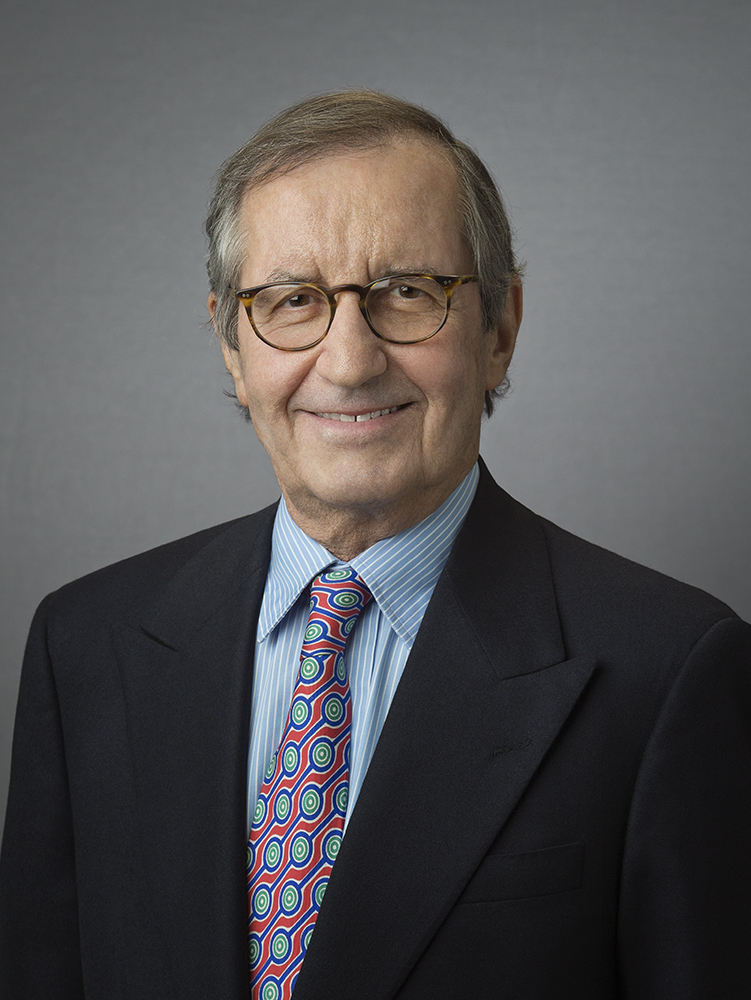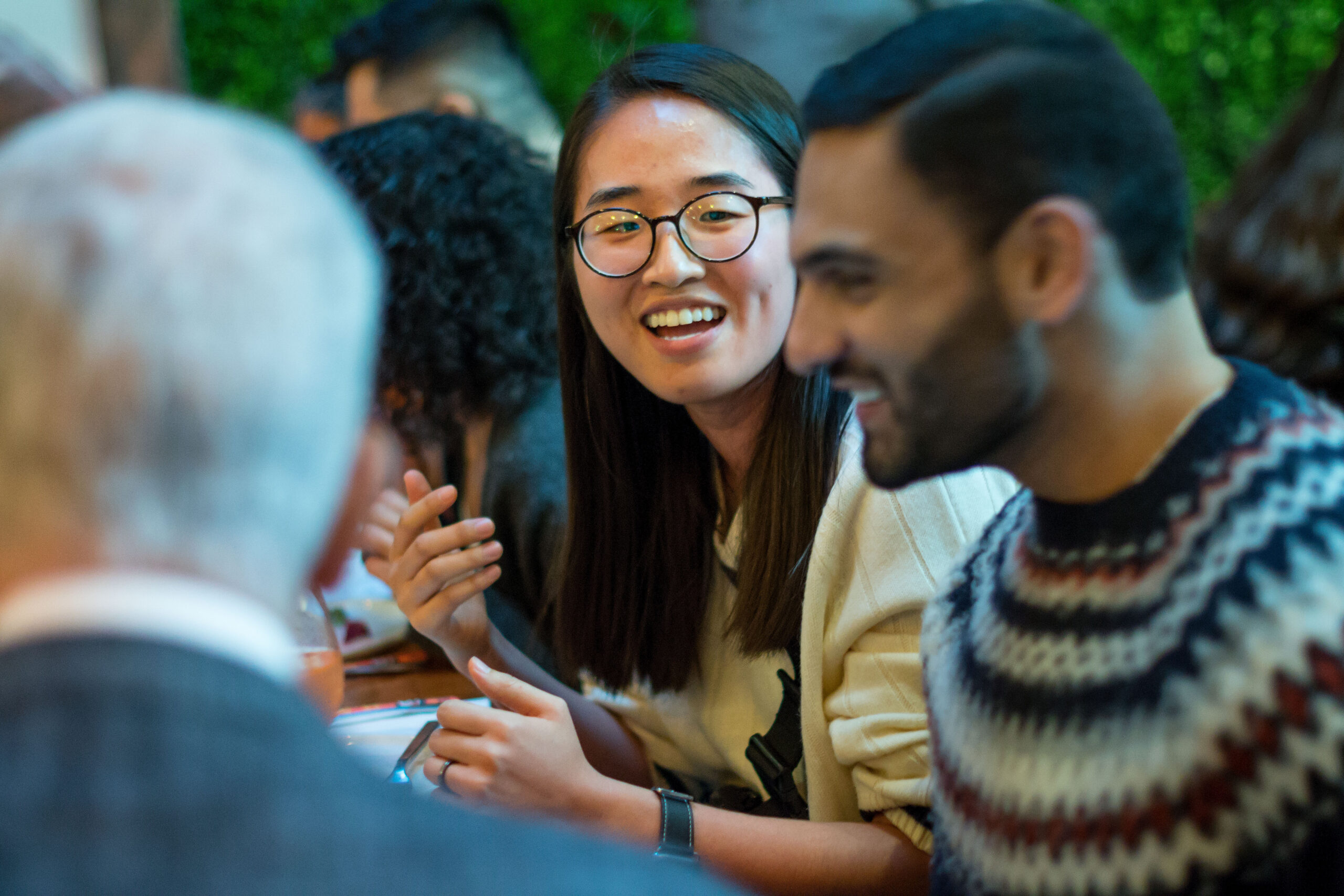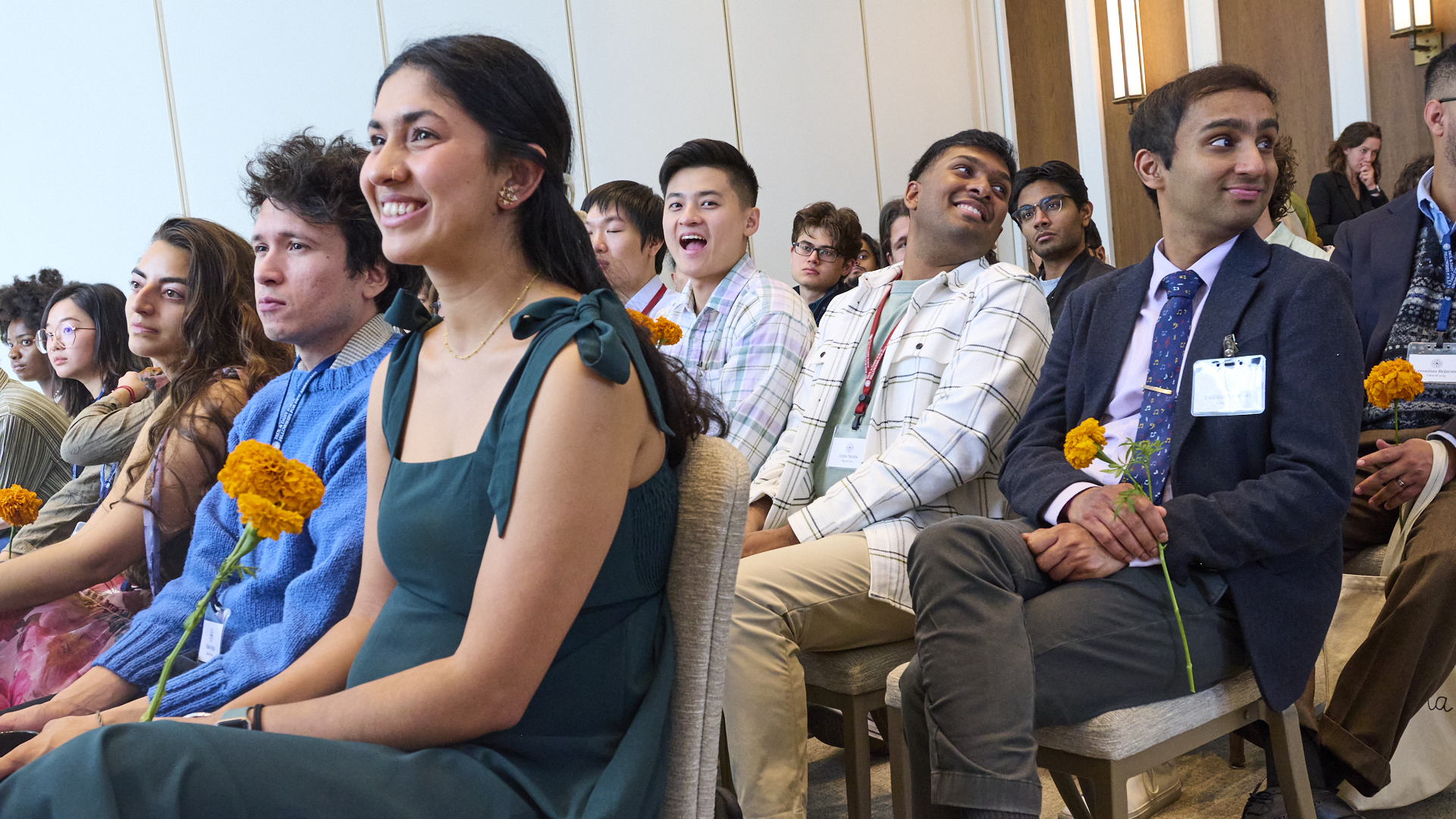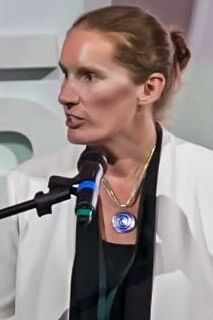- Fellow Highlights
How the Leader of Time and Time Warner Turned into an Environmentalist: Paul & Daisy Soros Trustee N.J. Nicholas Jr. Discusses the Politics of Hope in 2016
Before we had barely said our hellos, N.J. Nicholas Jr. and I were off to the races on politics when we talked by phone last spring. The former head of Time Inc. and Time Warner Inc., Nicholas is a former trustee of the Environmental Defense Fund and one of the leaders of the Nicholas Institute for Environmental Policy Solutions at Duke University, where I received my PhD. I was eager to quiz him about the state of the world and how his environmental work informs his worldview.
Highlights from this interview appeared in the 2016-2017 edition of The New American.

With your commitment to the environment, to multiculturalism, and to immigrant success being a cornerstone of a great America, are you hopeful?
I am hopeful, but I am more anxious, I guess. I am anxious about my grandchildren—the opportunities they’ll have and the society they’ll live in and be a part of. It used to be something that I thought, “Well, it will happen.” Now there’s a higher risk premium on my hopefulness.
That makes total sense.
I think there is broad and real concern among the leaders of big business and boards of directors, and sympathy with the idea that shareholder primacy has gone too far, with all of the corporate raiders and this “Give me one more dollar for this stock and I’ll sell you to the devil” type thing.
We need to go back to taking all of the other constituencies—starting with employees—into account, beginning with the old idea that employees should be a company’s competitive advantage and not simply an input. This is the kind of change that must be led by the business community because you can’t regulate this kind of thing. It has to be a shift that everything can’t be just for another dollar a share. That doesn’t mean that companies can underperform, but there has to be some commitment in a broad way to the kind of investments that take years to pull off, which is usually true of investments in people’s skills. I’m beginning to see a lot of discussion about this at universities, and the companies that I’m involved with that do this best are the companies that are doing best financially. They are the ones investing in R & D heavily and that see people as a resource, not as a cost of business.
Going back to the original idea of investing rather than gambling? We don’t need immediate payoff.
I’m thinking that there could be some kind of sea change over the next ten to twenty years in this area, which would be profound. When we opened up our country to globalization and trade, we didn’t think carefully enough about the impact on labor. Germany uses roughly three and a half percent of GDP for retraining. In this country, we’re at six tenths of one percent. That’s roughly one sixth on an equalization basis, and all of these people who are victimized along the daisy chain just got left behind.
Do you think that’s behind some of the anger with immigration as people are afraid of a more skilled workforce coming in from countries that have invested more in education and retraining?
As Mitt Romney said back in 2012, we should staple a green card to anyone skilled and trained who applies to come to the United States. I couldn’t agree more. We should be trying to attract talent from everywhere. At a minimum, it adds to our competitive advantage.
How did you first meet Paul and Daisy? Even knowing how wonderful they are, what was it in particular that got you interested in being part of the Fellowships?
It was very much an accident. It was at a point in time when Paul was in reasonably good health. I see that you’re the class of 2005; it was probably right around then. Daisy and I were sitting next to each other at a dinner party, and she suddenly asked, “Are you an immigrant?” She had caught something in the conversation earlier. And I explained that I’m first generation. My parents were both immigrants, and I consider myself, while not an immigrant, someone who is very comfortable, indeed enthusiastic, with the idea of this country being not only a place where immigrants have prospered but where they have basically driven our success, going all the way back to the beginning. She then described the Fellowships program to me briefly and mentioned the interview panels. She asked me if I’d be willing to serve as a panelist, and I asked her to send me materials to read and that I’d tell her if it’s something I’d like to do and something that I think I could do reasonably well. In the following days, I read through the materials and was very intrigued. I had never heard of it or anything like it. I said, “Sure, I’ll be a panelist.” What hooked me was spending a full day with eleven finalists and just being amazed at where they came from and their stories.
One of my grandfathers left Europe right on the cusp of World War I. He was an ethnic Greek who lived on what is now the coast of Turkey. Little did he know that millions of Greeks were going to get wiped out. But he had some sense of things—for him to come all the way over here, scout it out, and then return there to pick up his family—and this was 1910. Probably it’s a long-winded way of answering your question. The answer is that I just connect to the whole immigrant idea very comfortably: that the more talent we can help bring in, educate, and make comfortable is a good thing, that it’s not only a good thing, but that we ought to be doing a lot more of it.
What are you looking for when you’re with the finalists?
Of course all the finalists are bright and accomplished and have compelling stories. It’s somebody who just captures me. I’m saying, “Gee, I want to spend time with this person. I’d like to sit next to them at dinner and find out what it’s like to have done XYZ.” I try to attend the weekend Fall Conference where all the Fellows come to New York. I always look for a couple of people whom I’ve interviewed, and I look through the list. Their backgrounds are just amazing. I make a point of having a chat with them. We all have different stories.
What advice would you give to new Fellows today, given the current atmosphere? They’re about to enter graduate school or they have a couple of more years to go.
Boy, that’s tough because I’d like to say, “Ignore it,” but that sounds too flip. I’d like to say, “Ignore it because it’s coming from a minority of the population.” But after what we’ve seen and heard recently, I am less sure. You arrived here from Dublin and went to Notre Dame and Duke. I would say to you, “Hey, welcome. There are a gazillion more Irish people here than in Ireland of Irish descent, and you’re exactly the type of person we want to give an assist to.”
Do you think your own immigration story—knowing about your grandfather and how your father was the first in his generation to go to college—helped you succeed?
It’s complicated a bit by the fact that my father spent his life in military service. He went to the US Naval Academy because a) he loved the idea of it, and b) it was tuition free. He entered the school in 1928. I grew up moving every, say, two years. We moved to the East Coast, the West Coast, overseas—always somewhere on the water where there was a naval facility. We were a fairly hardy bunch; you almost have to be, or it’s bred into you along the way.
I don’t think I really appreciated the whole immigrant side of my mentality emotionally, intellectually, until a couple of years before college. I wasn’t an immigrant, and I didn’t have two languages. I lived around Navy people on naval bases: they all spoke the same language I did; they all looked the same for the most part. It wasn’t until I was in private school before college. I began to understand the immigrant side of who I am. It has a lot to do with what happened to me later in business—the drive, the wanting to pay back my grandparents, all of the things that go through your mind. It wasn’t that I had to be X or Y or whatever. It was a certain amount of persistence that I still have. It was just, “Turn the screw, half a turn, every day.”
You work in the environmental movement. That’s not a job for the lazy. If you can’t push a rock up a hill, don’t get into the environmental movement, because you have to be able to deal with it.
What got you involved in the environment? I mean, why do you, a Navy brat with a keen business mind, even care?
This will probably surprise you. Who are the two American presidents with the best environmental records? I would not grade you highly if you did not say Richard Nixon first, because he recognized the need in Washington to focus on these issues, and he formed the EPA, which did not exist.
The second was George H. W. Bush, who was a committed environmentalist and conservationist, as is his spouse. The 1990 Clean Air Act amendments were a seminal achievement. That was achieved, by the way, with broad bipartisan support, and it’s the foundation of everything that President Obama is doing in terms of clean power. President Bush, whom I knew, invited me to join his Commission on Environmental Quality. I said, “Thank you, but I think you have the wrong person. I have zero knowledge or experience to add to this.” He called back and said, “Would you consider trying it for a couple of meetings?” What do you say when a president asks for your help?
That persistence button turned on, didn’t it?
It did. I went to the first meeting and the second meeting. There were polluters present, but they didn’t want to be polluters: Dow Chemical, etc. I was running a media company, which is why they wanted me. I had never contributed a nickel to Bush campaigns, so it wasn’t a political thing. But there were CEOs of NGOs there whom I kind of admired: Fred Krupp of the Environmental Defense Fund, someone from the Nature Conservancy, someone from the World Wildlife Fund, and Bill Reilly, who was running the EPA. I liked the way these people positioned what their organizations did and how they did it and how they accomplished change. That was the beginning of my engagement. It was completely accidental. Completely. I began to get more and more involved, and I eventually joined the board of EDF and chaired that board for seven years.
Which parts of the environment constituency do you see yourself most in favor with? Is it conservation? Greening business?
The first thing that really appeals to me about the Environmental Defense Fund is that they’re very ecumenical. They like to get everyone around the table. They aren’t lawsuit oriented. The first thing you do is to get everybody around the table, the people for and against, and the science community. The idea is to look for a solution that will be enduring because the principal players all have a part in fashioning the solution. The second point is that they believe in market-driven solutions. For example, let’s take cap and trade for sulfur dioxide, which has been wildly successful in the United States and is beginning to be replicated in China, which was modeled after what we’ve done here. There is so much at stake in that institutions have taken investment positions—pension funds, you name it, right?—that, whether it be CO2 or SO2 or whatever, you just can’t unwind it very easily. I love to look for solutions that have a science, legal, and economic component to them, and where the principal players, the people who are supposedly going to benefit or get hurt, are signatories. I like solutions.
Listening to you, it’s clear that you’re a man who carries hope on his sleeve and believes in implementing it. There aren’t a lot of people who want to do that anymore, particularly on these sticky problems like the environment and immigration that aren’t easy to fix.
Thank you for asking that question about hope. I hadn’t really thought of it. I told one of my sons-in-law that the key to the next ten to twenty years in this country is more good jobs. Not just jobs, but good jobs in the eye of the beholder, the person who is employed. It has to be done by selective deregulation and constructive engagement of our political leaders with the private sector.
We’ve got regulations that go back to the 1920s and 1930s. The media industry is regulated by legislation that was intended to regulate a telegraph system that doesn’t exist anymore. It’s ridiculous, and it stifles innovation and capital spending in so many ways. It makes me crazy when I see examples of this. And my left-wing friends, of whom I have quite a few, usually say to me, “Well, give me some examples.” I’m happy to!
My son-in-law said, “Do you actually think we can deliver?” And I said, “Yeah, I think we can deliver on good jobs.” There are two and a half million jobs in the United States available today where the employer can’t find the talent needed.
The computer science industry isn’t finding the coders they need.
Absolutely.
It goes back to what you said at the start about the need to retrain and invest in labor and skills.
Yes, we do. No question about it. ∎
Interview by Valerie Hickey (2005), who is the practice manager of the World Bank Group’s Environment and Natural Resources Global Practice.
Keep Exploring
-
 Read more: Kathy Ku Steps into Leadership as PDSFA Chair
Read more: Kathy Ku Steps into Leadership as PDSFA Chair- Board of Directors
- Fellowship News
Kathy Ku Steps into Leadership as PDSFA Chair
-
 Read more: Q&A with MD/PhD Student Silvia Huerta Lopez
Read more: Q&A with MD/PhD Student Silvia Huerta LopezQ&A with MD/PhD Student Silvia Huerta Lopez
-
 Read more: PD Soros Eligibility Guide for PhD Applicants
Read more: PD Soros Eligibility Guide for PhD Applicants- Applicant Information
PD Soros Eligibility Guide for PhD Applicants
-
 Read more: Watch: Optional Exhibits & Recommendations
Read more: Watch: Optional Exhibits & Recommendations- 2025 Information Sessions
Watch: Optional Exhibits & Recommendations
